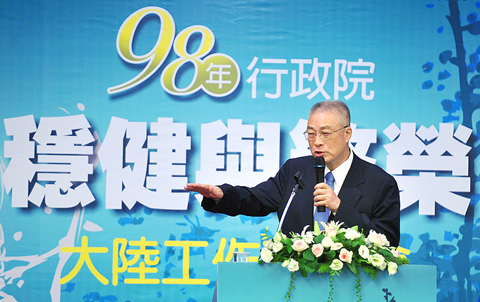Taiwan must consolidate relations with other democracies and maintain self-defense capabilities, Premier Wu Den-yih (吳敦義) said yesterday ahead of another round of cross-strait talks scheduled for December.
Wu said Taiwan could not safeguard its national security and the wellbeing of its people based solely on cross-strait detente.
Advising civil servants on the government’s cross-strait policy, Wu said that its policies hinged on two principles: maintaining the integrity of the sovereignty of the Republic of China and ensuring the interests of Taiwan’s 23 million people.

PHOTO: LIU HSIN-DE, TAIPEI TIMES
“While improving our relationships with [China], we must also consolidate ties with the US, Japan, Europe and other freedom-loving countries governed by the rule of law in terms of political, diplomatic and economic relations while shoring up self-defense military strength,” Wu said.
“Putting Taiwan first for the benefit of the people” remains the government’s paramount principle in determining cross-strait policy, Wu said.
“We should not do things that are not beneficial to the public,” he said. “Those who execute cross-strait policies should act as gatekeepers when necessary and step on the brakes where necessary to maintain these principles.”
Wu said the proportion of the country’s exports to China and Hong Kong had risen to 40 percent of its total annual exports, or about US$130 billion per year.
“The trade surplus we have with China last year was higher than the annual government budget ... We need to enhance economic ties with Japan, the US and ASEAN countries,” he said
Wu said the government’s plan to sign an economic cooperation framework agreement (ECFA) with China remained essential.
“How can we ignore the huge market [of China] and the rising biggest factory in the world?” he said.
The planned formation of free-trade zones consisting of ASEAN plus China and ASEAN plus China, Japan and South Korea would cause local businesses to lose their competitive edge, which makes the ECFA imperative, Wu said.
In a related development, Mainland Affairs Council Deputy Minister Liu Te-shun (劉德勳) said yesterday that the next round of cross-strait talks had been tentatively scheduled to be held in Taichung in December.
The decision was reached when Straits Exchange Foundation Secretary-General Kao Koong-lian (高孔廉) and his Chinese counterpart, Association for Relations Across the Taiwan Strait Deputy Chairman Zheng Lizhong (鄭立中), met in Hangzhou in China’s Zhejiang Province on Tuesday.
Kao and Zheng discussed four issues to be addressed during the meeting in Taichung: fishing industry cooperation, quality checks for agricultural products, cross-strait cooperation on the inspection and certification of products and preventing double taxation.
Liu dismissed speculation that Kaohsiung or other places in southern Taiwan had been blacklisted as possible summit venues because of recent events that displeased China, such as the Dalai Lama’s visit to Taiwan and the screening of a documentary about Uighur activist Rebiya Kadeer in Kaohsiung.
Since southern Taiwan was hit hard by Typhoon Morakot in August, Taichung was considered a more suitable location for the talks, Liu said.

ENDEAVOR MANTA: The ship is programmed to automatically return to its designated home port and would self-destruct if seized by another party The Endeavor Manta, Taiwan’s first military-specification uncrewed surface vehicle (USV) tailor-made to operate in the Taiwan Strait in a bid to bolster the nation’s asymmetric combat capabilities made its first appearance at Kaohsiung’s Singda Harbor yesterday. Taking inspiration from Ukraine’s navy, which is using USVs to force Russia’s Black Sea fleet to take shelter within its own ports, CSBC Taiwan (台灣國際造船) established a research and development unit on USVs last year, CSBC chairman Huang Cheng-hung (黃正弘) said. With the exception of the satellite guidance system and the outboard motors — which were purchased from foreign companies that were not affiliated with Chinese-funded

PERMIT REVOKED: The influencer at a news conference said the National Immigration Agency was infringing on human rights and persecuting Chinese spouses Chinese influencer “Yaya in Taiwan” (亞亞在台灣) yesterday evening voluntarily left Taiwan, despite saying yesterday morning that she had “no intention” of leaving after her residence permit was revoked over her comments on Taiwan being “unified” with China by military force. The Ministry of the Interior yesterday had said that it could forcibly deport the influencer at midnight, but was considering taking a more flexible approach and beginning procedures this morning. The influencer, whose given name is Liu Zhenya (劉振亞), departed on a 8:45pm flight from Taipei International Airport (Songshan airport) to Fuzhou, China. Liu held a news conference at the airport at 7pm,

AIR SUPPORT: The Ministry of National Defense thanked the US for the delivery, adding that it was an indicator of the White House’s commitment to the Taiwan Relations Act Deputy Minister of National Defense Po Horng-huei (柏鴻輝) and Representative to the US Alexander Yui on Friday attended a delivery ceremony for the first of Taiwan’s long-awaited 66 F-16C/D Block 70 jets at a Lockheed Martin Corp factory in Greenville, South Carolina. “We are so proud to be the global home of the F-16 and to support Taiwan’s air defense capabilities,” US Representative William Timmons wrote on X, alongside a photograph of Taiwanese and US officials at the event. The F-16C/D Block 70 jets Taiwan ordered have the same capabilities as aircraft that had been upgraded to F-16Vs. The batch of Lockheed Martin

GRIDLOCK: The National Fire Agency’s Special Search and Rescue team is on standby to travel to the countries to help out with the rescue effort A powerful earthquake rocked Myanmar and neighboring Thailand yesterday, killing at least three people in Bangkok and burying dozens when a high-rise building under construction collapsed. Footage shared on social media from Myanmar’s second-largest city showed widespread destruction, raising fears that many were trapped under the rubble or killed. The magnitude 7.7 earthquake, with an epicenter near Mandalay in Myanmar, struck at midday and was followed by a strong magnitude 6.4 aftershock. The extent of death, injury and destruction — especially in Myanmar, which is embroiled in a civil war and where information is tightly controlled at the best of times —